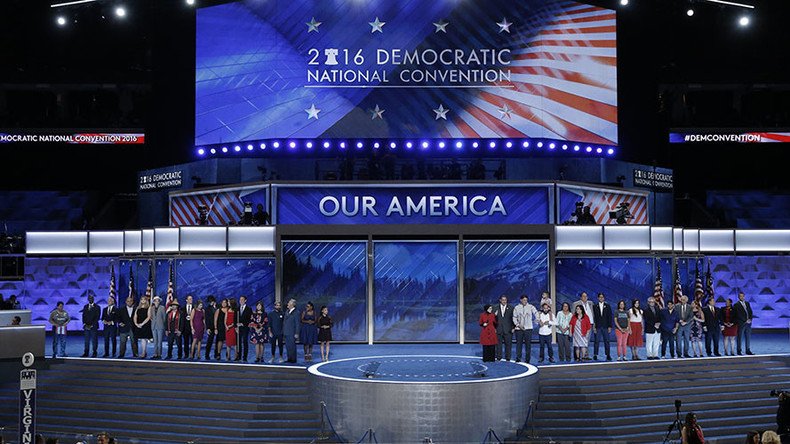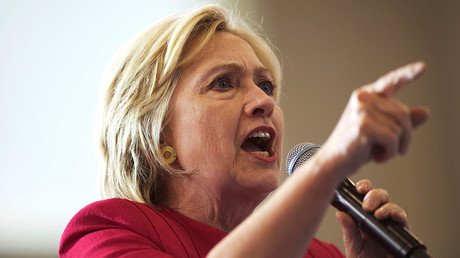US media opens anti-Russia witch hunt to cover-up (real) DNC scandal

What course of action should the US media take when a batch of leaked emails reveal dirty dealings inside of the Democratic National Committee in a pivotal election year? Blame the Russians, of course.
In an effort to expose the dry rot gnawing away at the foundation of the US political system, Russia, according to that bastion of journalistic infallibility, The Washington Post, has now joined ranks with irksome whistleblowers and is data dumping on the 2016 presidential elections.
“U.S. intelligence and law enforcement agencies are probing what they see as a broad covert Russian operation in the United States to sow public distrust in the upcoming presidential election and in U.S. political institutions,” Dana Priest, Ellen Nakashima and Tom Hamburger wrote, and I would hope with all three tongues in cheek.
Alleging that Russia is to blame for attempting to “sow public distrust in the upcoming presidential election” is not only a delightful piece of nonsense; it is subterfuge on a grand scale.
First, America’s faith in its leaders has been on a long, steady decline ever since the 1950s, peaking out around 2008 with the financial crisis. According to a recent Pew poll, “trust in the federal government continues to be at historically low levels. Only 19 percent of Americans today say they can trust the government in Washington to do what is right “just about always” (3 percent) or “most of the time” (16 percent).
It is extremely unlikely the Soviets were hacking Washington's email boxes in the 1950s.
Second, claims that the Russians are attempting to hijack the 2016 presidential elections is a scurrilous attempt to conceal the really salacious aspects of the DNC email bombshell, which The Washington Post article barely skims. It had nothing to do with Russia, of course, but rather with the explosive content of the leaked DNC correspondences, which revealed a concerted effort to sideline Democratic presidential contender Bernie Sanders in favor of Hillary Clinton.
On the Richter Scale of political intrigue, this would rate about a 9.5 (almost on par with the Watergate scandal, I'd reckon, which finished Richard Nixon's career), and deserves to be the subject of yet another election-year FBI probe.
Yet the Post article never once mentions the name Bernie Sanders, and provides just bones of information regarding the full extent of the scandal. Here is the best that Priest, Nakashima and Hamburger can muster regarding the WikiLeaks release on the eve of the Democratic Convention: “The disclosures, which included a number of embarrassing internal emails, forced the resignation of DNC Chairwoman Debbie Wasserman Schultz.”
To describe the leaked DNC emails as “embarrassing” may just be the media understatement of the year. Clearly, the discerning reader will glean nothing from ‘reading between the lines’ of this article, but must fill in the glaring blanks for themselves. Not only does the Post article conspicuously avoid mentioning Sanders, it also fails to discuss the untimely death of Seth Rich, a DNC staffer who was gunned down in Washington, D.C. on July 8, 2016.
Rich, 27, was working on several DNC cases involving voter and election fraud, and was also scheduled to testify in the FBI’s email probe before he was killed. It must be emphasized that although there is no evidence whatsoever linking Rich's untimely death to some sort of (domestic) political foul play, the very same could be said about a Russian connection to the leaked emails: Nada, zero, zip, zilch. Incidentally, although police say Rich was the victim of an attempted robbery (he was said to be walking home late in a rough part of the neighborhood), none of his personal belongings were stolen.
WikiLeaks founder Julian Assange stirred up the conspiracy chatter when he appeared to suggest that Seth Rich was the informant who handed over the DNC emails to his whistleblowing site.
“Whistleblowers often take very significant efforts to bring us material and often at very significant risks,” Assange told the Dutch television program Nieuwsuur. “There’s a 27-year-old who works for the DNC and who was shot in the back, murdered, just a few weeks ago, for unknown reasons as he was walking down the streets in Washington.”
The Wikileaks founder then put out a $20,000 reward for information leading to arrests in the death of Seth Rich.
So what sounds like the more plausible choice for a groundless “conspiracy theory” in the DNC case? 1. The story that Seth Rich was shot dead just before testifying in the DNC email case, possibly complicating Clinton’s chances at the White House, or 2. The story that the Russians had a hand in the email leak because they want to spread anti-American disinformation? Well, if you work for the Western mainstream media, the choice is obvious.
As Newsweek reported: “It was closing time at Lou’s City Bar when Seth Rich drained the last of his Bell’s Two Hearted Ales and started walking into the muggy night… his decision to walk that night would become part of a wild election-year conspiracy theory that once again portrays Hillary Clinton and the Democrats as murderous criminals.”
And thus Newsweek saddled up its own conspiracy theory horse, riding into the sunset without a precious drop of fact in its canteen: “There was no indication that any insider was involved in [the DNC email leak],” according to one of many anonymous sources. “Every indication is this was a remote attack from a foreign government—the Russians. There is no indication that…there was any nefarious action taken by any employees in that environment.”
Somehow it makes more sense to Newsweek - and despite a recent flurry of whistleblowers coming out of the Western woodwork, willing to expose the criminal activities of their employers - that “the Russians”, and not some conscience-driven employee of the DNC, was responsible for the devastating leaks.
And of course The Washington Post ran with the rubbish, but not to the city dump where it belongs. Consider the following sentence, which opens by blaming the Russians, and finishes before the period buzzer by admitting there is zero basis for the accusations: “The Russian government hack of the Democratic National Committee, disclosed by the DNC in June but not yet officially ascribed by the U.S. government to Russia… shocked officials.”
Just imagine a judge listening to a prosecutor charging a defendant on the basis of that vacuous argument. He'd be laughed straight out of the courthouse.
Here’s Priest, Nakashima and Hamburger beating yet another retreat from the story's sensational headline: “The official cautioned that the intelligence community is not saying it has ‘definitive proof’ of such tampering, or any Russian plans to do so. ‘But even the hint of something impacting the security of our election system… would be of significant concern.’”
So even though there may be some miniscule “hint” that Russia played a part in the DNC email dump, the US media jumps on that 0.00001 percent chance as some sort of absolute certainty, and proceeds to splash Russia and Putin across the front pages, while obliterating the truly important story buried below a pile of anti-Russia hype and hysteria. When will nation states be able to sue for defamation of character? What would American criminals do without a Russian fall guy?
But don’t give up hope on the System just yet. The United States has promised to launch a major investigation – not into the mysterious murder of DNC staffer Seth Rich - but rather into “Russia’s covert influence operations”. And who better for the job than - wait for it - James R. Clapper Jr., the director of national intelligence, who told a 2013 Senate hearing the NSA never collected data on American citizens?
Documents leaked by Edward Snowden, a former contractor for the National Security Agency, later proved that the agency had been gathering and storing phone meta-data on American citizens for years.
Once again, Russia can expect nothing less than a fair and impartial hearing from US officials.
The statements, views and opinions expressed in this column are solely those of the author and do not necessarily represent those of RT.














